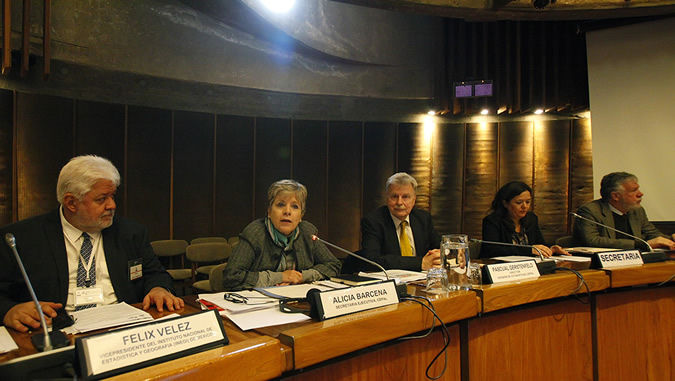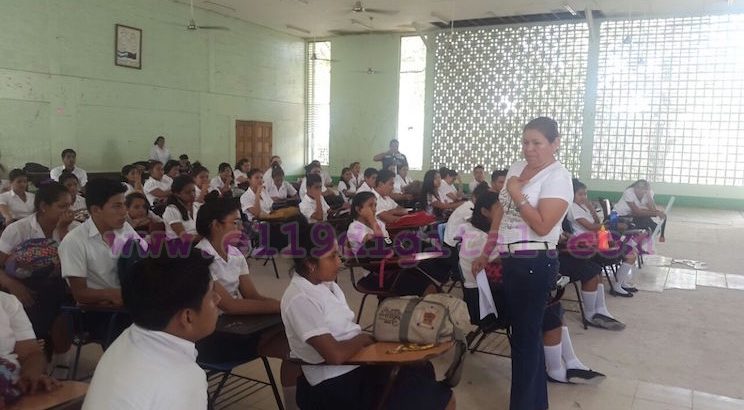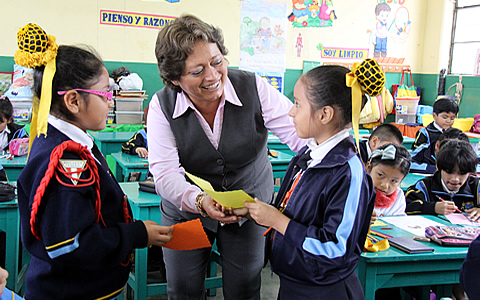Fuente CEPAL 16 de junio de 2016
La Secretaria Ejecutiva del organismo regional, Alicia Bárcena, presentó el Foro de los Países de América Latina y el Caribe sobre el Desarrollo Sostenible, en el marco de la XV Reunión del Comité Ejecutivo de la Conferencia Estadística de las Américas (CEA).
Representantes de institutos nacionales de estadística de países de la región se reúnen desde hoy y hasta el 16 de junio en la sede de la Comisión Económica para América Latina y el Caribe (CEPAL) para revisar los mecanismos de medición y coordinación estadística para el seguimiento de la Agenda 2030, aprobar los trabajos que se realizarán en el bienio 2016-2017 en el marco de la Conferencia Estadística de las Américas (CEA), y analizar fuentes y usos de datos no tradicionales.
La XV Reunión del Comité Ejecutivo de la CEA, órgano subsidiario de la CEPAL, fue inaugurada hoy en Santiago de Chile por la Secretaria Ejecutiva de esta comisión regional, Alicia Bárcena; por el Vicepresidente del Instituto Nacional de Estadística y Geografía (INEGI) de México, Félix Vélez, como Presidente del Comité Ejecutivo, y por el Director de la División de Estadísticas de la CEPAL, Pascual Gerstenfeld.
“La Conferencia Estadística de las Américas se ha convertido en la plataforma privilegiada para la creación de una arquitectura regional interinstitucional e intersectorial que facilite los espacios necesarios para la implementación de los mecanismos de seguimiento nacionales de la Agenda 2030. Cuenten como siempre con todo el apoyo técnico e institucional de la CEPAL para abordar los desafíos que supone esta Agenda”, señaló Alicia Bárcena.
Por su parte, Félix Vélez, del INEGI de México, resaltó que el trabajo de la Conferencia debe aportar elementos para la toma de decisiones a todos los niveles de gobierno. Además de México en la Presidencia, el Comité Ejecutivo de la CEA para el período 2016-2017 está integrado por Belice, Costa Rica, Ecuador, España, Perú y Uruguay, cuyos representantes asisten a esta reunión junto a delegados de otros países miembros de la CEA.
Esta es la primera reunión de comité ejecutivo de uno de los nueve órganos subsidiarios de la CEPAL desde que el organismo regional celebró su trigésimo sexto período de sesiones en México (del 23 al 27 de mayo), donde se aprobó la creación del Foro de los Países de América Latina y el Caribe sobre el Desarrollo Sostenible como mecanismo regional para el seguimiento de la Agenda 2030, en el que participarán, entre otros, dichos órganos. El foro fue creado por los países bajo el liderazgo de Perú, y será presidido por México hasta 2018.
Tras la inauguración se celebró un seminario sobre el marco estadístico para el seguimiento de los 17 Objetivos de Desarrollo Sostenible (ODS), en el que Alicia Bárcena presentó los principales resultados del trigésimo sexto período de sesiones: el nuevo documento estratégico en el que la CEPAL ofrece un marco analítico para la Agenda 2030; el debate sobre la implementación de esta Agenda y el fortalecimiento de la arquitectura regional, a través de los órganos subsidiarios de la CEPAL y del nuevo foro aprobado en México.
Según explicó la Secretaria Ejecutiva, en el documento Horizontes 2030: La igualdad en el centro del desarrollo sostenible la CEPAL propone un cambio estructural progresivo y un gran impulso ambiental para el desarrollo de la región con la igualdad en el centro. Para la implementación de la Agenda 2030, el organismo establece varias recomendaciones, entre ellas, el fortalecimiento tanto de las capacidades estadísticas para la medición de los ODS como de la arquitectura regional, aspectos en los que la CEA tiene un papel clave.
De cara al ámbito global, Alicia Bárcena valoró el papel de los países de América Latina y el Caribe que forman parte tanto del Grupo interinstitucional y de expertos sobre los indicadores de los ODS, como del Grupo de alto nivel de colaboración, coordinación y fomento de la capacidad para las actividades de seguimiento después de 2015. En el primero participan en representación de la región Brasil, Colombia, Cuba, Jamaica y México; mientras que en el segundo figuran Argentina, Bahamas, Ecuador, El Salvador y Santa Lucía.
Los ejes del Plan Estratégico 2015-2025 de la Conferencia Estadística de las Américas, aprobado en suoctava reunión, celebrada en Ecuador en noviembre de 2015, son promover el desarrollo de las estadísticas nacionales y su comparabilidad internacional; contribuir al fortalecimiento institucional de los sistemas nacionales de estadística; potenciar la cooperación internacional en esta área, y promover la apertura de datos e incorporar datos no tradicionales, como la información geográfica y las herramientas de georreferenciación.
En este ámbito se incluye asimismo el uso de registros administrativos con fines estadísticos, tema sobre el que Anders Wallgren y Britt Wallgren, expertos de Statistics Sweden, el instituto de estadísticas de Suecia, y de la universidad estatal de Örebro, ofrecerán una conferencia magistral en el marco de esta reunión.
Sobre la base del Plan Estratégico, en esta reunión se someterá a examen y aprobación de los delegados el programa bienal de las actividades de los diecisiete Grupos de Trabajo 2016-2017 de la Conferencia, dedicados a tratar materias específicas como los censos, las encuestas de hogares, las cuentas nacionales o las estadísticas de pobreza, de género o de infancia, entre otras.
Como eventos paralelos a esta reunión, esta semana también se llevan a cabo en la CEPAL unseminario sobre procesos censales en América Latina al 2016, un encuentro sobre la medición del bienestar, y una reunión de la CEA junto al Comité de Expertos de las Naciones Unidas sobre Gestión de Información Geoespacial para las Américas (UN-GGIM para las Américas).













 Users Today : 205
Users Today : 205 Total Users : 35459800
Total Users : 35459800 Views Today : 367
Views Today : 367 Total views : 3418339
Total views : 3418339